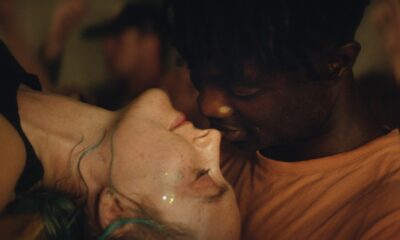Somewhere under the rainbow: an astonishing journey into the American subconscious. Barren landscapes tend to allow for densely layered storytelling. This is the case with the semi-apocalyptic, meta-American wasteland of Fugitive Dreams. Not-so-intrepid explorers Mary (April Matthis) and John (Robbie Tann) meet when John rushes into a women’s bathroom by mistake and finds Mary with a blade of glass to her wrist. The film’s (surprisingly ample) comedy continues the same way – a homeless depressive and a manic walk into a bar…but it works: the characters neurosis counterbalance each other perfectly as John, concerned, takes it upon himself to follow Mary on her way.

In a familiar formula, the ‘road-trip’ storyline is used by poetic writers (Caridad Svich and Director Jason Neulander) as a nice canvas for the character’s to experience an inward journey. As the road goes on — from uneasy train journeys to races through tunnels and piggybacks off the beaten track — Mary and John slowly begin to reveal the different traumas they are aimlessly running from.
A lot of the imagery and dialogue is allegorical – but at the heart of the film is John and Mary’s very realistic trauma-bond. The chemistry between the talented Matthis and Tann is lovely — ebbing constantly between jarring arguments about the Bible and lying in each other’s arms in the dust.
The performances are grounding and powerful, the leads just as capable of being funny (a wrestle they have outside of a store John has robbed is a stand-out) as they are of portraying the physical agonies of slow on-set starvation (John) and quiet suicidal thoughts (Mary). It’s not really romantic (‘I’m not having sex with you’ Mary says, ‘Good, I’m not having sex with you either’ John replies) but it’s a bruised and battered story about kindness getting you through.
Scott Shepherd and David-Patrick-Kelly inject pure dread into things as predatory strangers. Shepherd’s performance is riveting as Israfel, a smirking, Lucifarian type who joins John and Mary on a train journey and hints that he might know John is more than he appears. O-Lan Jones is also superb as his non-verbal mother, Providence, who switches from sweet to freaky when she communicates in hoarse screams (in such a climate, who wouldn’t?)

Cinematographer Peter Simonite’s work is wonderful. Striking, monochrome shots work for every mood: swirling hallmark snow on a moment of reconciliation, a slightly over-sized moon dangling over Mary’s head as she walks into a lake, and sprawling, sudden technicolour for the woodlands and poppy fields of John’s feverish hallucinations. Nathan Hamilton’s score gives the story a driving, spaghetti-western energy when the action slows down.
The thing about trauma is that you can’t get anywhere without facing it first. The seemingly meandering plot of Fugitive Dreams is testament to this: Mary and John experience the same cycle of violence, hunger, exhaustion, collapse, get back up, repeat, etc. until they’re compassion for the other pushes them to challenge the memories they haven’t been facing.
It’s a nice added touch that their traumas are different: like Mary’s past with police brutality and grief as a black woman trying to eke out a peaceful existence, and John’s more specific experiences with drugs and domestic abuse. Suffering does exist on both a systemic and personal level, and the film’s passionate depiction of the road to recovery from both will hopefully allow all sorts of people to feel validated.
Fugitive Dreams was reviewed at Fantasia 2020.
Fugitive Dreams
Abi Silverthorne
Summary
There’s plenty of violence, plenty of pain, and plenty of hope: in this way Fugitive Dreams is a haunting postcard from Americans on the brink between destruction and recovery.

Latest Posts
-


Features
/ 11 hours agoAdele Parks – From Page to Screen
Adele Parks MBE is one of the UK’s best-selling authors. She has sold over...
By Paul Heath -


Film News
/ 12 hours agoA third ‘Downton Abbey’ film is on the way
Simon Curtis is returning to direct after helming 2022’s Downton Abbey: A New Era.
By Paul Heath -


Film Trailers
/ 13 hours agoNew trailer for Jeff Lipsky’s drama ‘Goldilocks and the Two Bears’
A new U.S. trailer has been released for Jeff Lipsky’s provocative drama Goldilocks and...
By Paul Heath -


Film Trailers
/ 13 hours agoTrailer for ‘Unicorns’ with Ben Hardy and Jason Patel
Signature Entertainment has landed a trailer and poster for their upcoming release, Unicorns. The...
By Paul Heath















